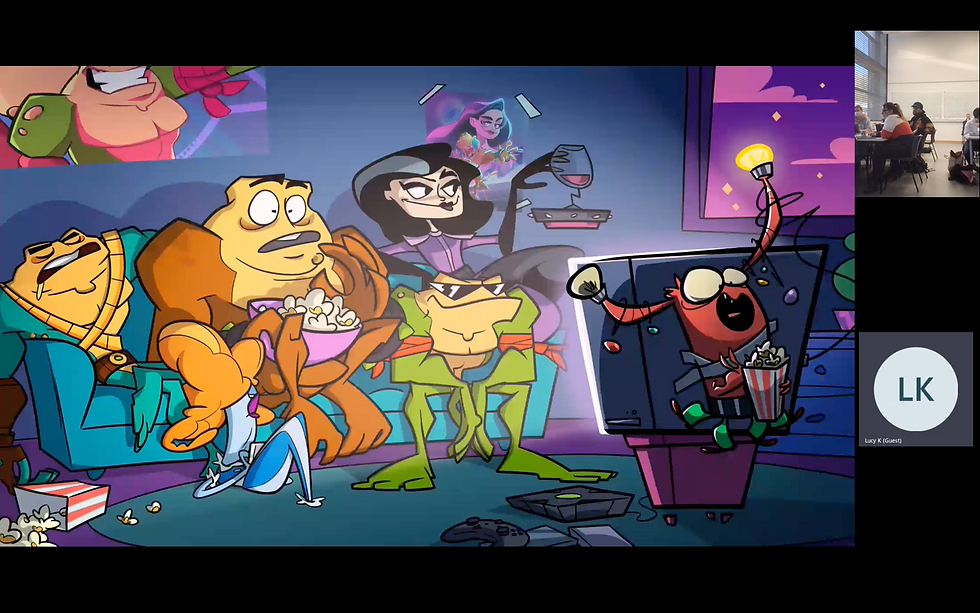Dan Bernardo:
- pm3u19
- Nov 6, 2021
- 3 min read
Updated: Jan 11, 2022
About the speaker:

Platra is also developing its new game 'Gridforce' currently in its closed beta phase.
What you need in the games industry: skillset: The type of skills a studio is looking for will vary all the time depending on the role you are applying for although this is the case they can usually be split into three fields in which they look at.
I vs T vs V (skill sets): This is all about the way you learn and hone your skills if it is all out specialist in one subject or a jack of all traits.
Genre specific: your skills could only be to one specific genre of game e.g 3D modelling won't have much of a place if the studio focuses on 2D games
Hard vs Soft (skills): Are the skill you have hard or soft skills, you may be missing some technical skill for the role but if they are 'soft' skills they can be taught and therefore it won't be an issue.
Competition: This is all about the things in the industry that you have no control over. In some examples this can feel unfair and it is slowly getting better in the industry, these are some specific. ways it can feel unfair.
Expectations: This is the things that the company will expect of you. these are usually unreasonable but this is mainly because the industry is flooded with new talent. so they think what they have pick will be able to do everything.
Compensation: few roles have good compensation especially entry level roles you may need to adjust your expectations for going into this industry.
Hidden biases: This is about things that you are unconscious bias about this could be if someone has colour hair or looks queer they may be unintentionally treated poorly
Culture: This is down to the workplace that you will be working for how the studio works internally. here as some different ways that the studios you apply for can have some red flags you may need to be aware of.
Environment: this is about if the work environment expects you to overworking and different tolerance for mistakes as a new employee.
Creativity: this is whether or not you are willing to follow someone else's creative images. if you join a big studio you may find that it will take ~10 years until you will find creative freedom is eased off you.
Open biases: Here you can find the studios have different tolerance to certain things like internal jokes and how the employees communicate to each other.

What this means for me:
Different scale of studios will treat these points differently, some will value them more some will not value them at all, here is a diagram showing which type of studio (indie or bigger studio) will value what asset.
Because of this Dan says
‘You are the main asset’ and ‘you choose us even more than we choose you’
You know what will work best for you, so aim for it. If you feel like it is not a right fit, it probably isn’t. just because big studios typically are more strict with your expectations doesn't mean it is bad, your work ethic could play into that and create an environment where you learn more and develop your skills at a faster rate.
What do you look for in a Portfolio? (for a junior artist role):
Quality over quantity. I much prefer 5 good pieces rather than a full jam packed portfolio, the sandwich technique works (best first second best last). Lastly have a variety so you can show the broad horizon of styles. Don’t have all your pieces showing one style because it doesn’t show your ability to pivot your art style.
Thoughts on this lecture:
the industry is harsh but after some time getting through the teething problems and getting pass the entry level jobs you find a lot of the negative aspects may ease off. Also this talk gave me great insight into how an indie studio head thinks and the process they go through when it comes to hiring new employees for their studio and I can use that Information as well as his advice about portfolio's to give me more of a chance when it comes to getting a job in the industry.
Another thing to take away with a pinch of salt is don't specialise too much, its fine to have areas to expand in, studios both big and small would rather transferable skills than a someone who is a fraction of their best once they have to use something they aren't a specialist in or a art style they are not comfortable in.



Comments